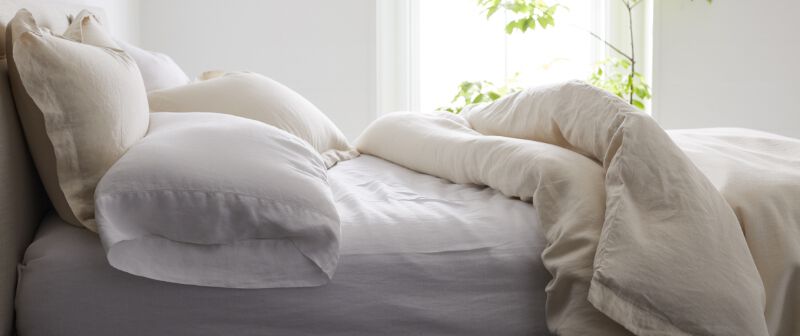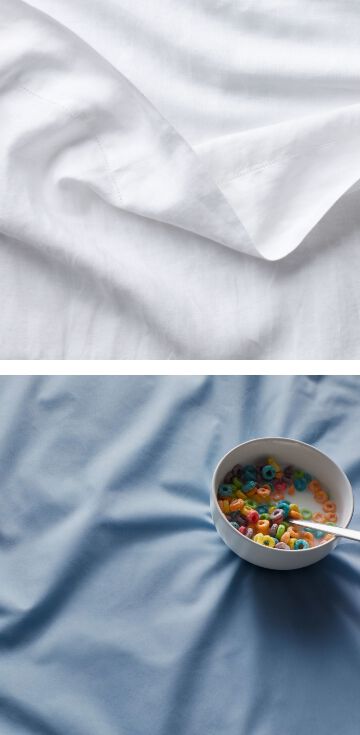Linen Versus Cotton Sheets: Which Is Best?
When it comes to premium bedding, linen and cotton are both good options for breathable, easy-care sheets that feel great against the skin. These natural materials are seen as superior due to their moisture-wicking, breathable qualities. To decide whether linen or cotton is best, consider the differences and similarities between the two popular fibers.
What is Linen?
One of the oldest textiles in the world, linen has been in use for thousands of years. Fibers from the flax plant are extracted, spun, and woven into linen fabric, which is then used to make everything from clothing to bedding.

Benefits of Linen Sheets
These top benefits are among the many reasons to love linen sheets:
- Crafted of natural fibers
- Strong and durable
- Incredibly breathable
- Moisture-wicking and highly absorbent
- Cool in summer, warm in winter
- Antibacterial properties
Disadvantages of Linen Sheets
To give it a fair consideration, it's also important to note the disadvantages of linen:
- Prone to wrinkles
- Can be stiff at first (but gets softer and softer over time)
- High upfront cost
Linen Care: While it can go in the washing machine, linen is prone to wrinkles—they’re part of the fabric's relaxed, laid-back appeal. To reduce wrinkles, wash your sheets in cold water then dry on a low-heat setting.
What is Cotton?
Cotton fibers are spun into thread or yarn, which is then woven or knit into a variety of versatile fabrics. It's occasionally blended with other natural or synthetic materials to enhance its innate qualities.
Softness, warmth, and other specific characteristics differ depending on the type of cotton fabric: Cotton sateen sheets are silky smooth and extra-warm, percale is crisp and cool, fuzzy flannel insulates in cold weather, and jersey knit is as comfortable as your favorite T-shirt.

Benefits of Cotton Sheets
Whichever weave you choose, there are many benefits of cotton sheets:
- Natural material, with organic options available
- Insulating for warmth, breathable for comfort
- Moisture-wicking
- Low-maintenance and easy to clean
- Wrinkle-resistant options available
- Available in a wide range of solid designs and colorful prints
Disadvantages of Cotton Sheets
However, it's also important to consider cotton's disadvantages before choosing sheets:
- More wrinkle-prone than some materials (but less than linen)
- Longer drying times
- Not all cotton is eco-friendly
Comparing Linen Versus Cotton
Linen and cotton are some of the best sheet fabrics available, but there are a few notable differences between these materials. Consider care, feel, and appearance to decide between linen sheets and cotton sheets.
Do Linen or Cotton Sheets Wrinkle More?
Wrinkling is a common complaint for both cotton and linen sheets, but ultimately, linen is more prone to wrinkles. While ironing can remove some of the material's natural rumples, some creases are inevitable—it's easier to keep cotton sheets smooth. If you prefer sheets without a wrinkle in sight, opt for cotton sateen.
Is Linen or Cotton Softer?
Both linen and cotton sheets are soft, but linen has a slight edge here because it gets softer with every wash. Cotton sheets may differ in softness depending on the weave you choose: percale offers a crisp feel, sateen is buttery-smooth, flannel is napped for a fuzzy surface, and cotton/rayon made from bamboo blends are incredibly silky.
Are Linen Sheets Cooler Than Cotton?
Linen sheets are generally considered cooler than cotton, but both fabrics are good options for hot sleepers. These moisture-wicking materials pull sweat away from the body, helping to keep you comfortably cool while you sleep. Linen is also more absorbent than cotton, making moisture-wicking a linen superpower. When looking for cool cotton sheets, percale or a bamboo blend are good options. Skip heavier sateen if you’re prone to hot, sweaty sleep.
Is Cotton or Linen More Breathable?
Both linen and cotton are breathable, but which is more breathable depends on other factors. Linen’s hollow fibers allow excellent air circulation for an incredibly breathable option, while cotton may be more or less breathable depending on the weave.
Do Linen Sheets Last Longer Than Cotton?
Linen is more durable than cotton for sheets. The long flax fibers that improve breathability and moisture-wicking also create a stronger fabric, so linen not only outlasts cotton but many other bedding materials as well. Linen's longevity also balances out its higher upfront cost. Cotton is also a durable option, but linen has a slight advantage when it comes to lifespan.

The Verdict: Are Linen or Cotton Sheets Better?
Whether cotton or linen is better depends on what matters to you. Let's look at some of the top priorities when choosing bed sheets to see which material comes out on top:
- Cost: Cotton sheets are better than linen if you're looking for a budget-friendly option.
- Coolness: Linen is cooler than cotton thanks to its superior absorbency and moisture-wicking ability.
- Warmth: Cotton flannel sheets are the warmest option, thanks to their brushed surface that traps heat, but linen sheets are also naturally insulating, so they are just as comfortable in winter as they are in summer.
- Softness: Linen is better than cotton when it comes to softness, since it gets softer over time.
- Maintenance: Cotton wrinkles less than linen and is easier to wash and keep clean.
- Durability: Linen is up to three times more durable than option, making linen sheets your best pick if longevity is your priority.
Ultimately, natural materials make the best bedding, so you can’t go wrong when choosing between linen versus cotton sheets. After you’ve decided, explore our other Guides for more bedding and decor tips.